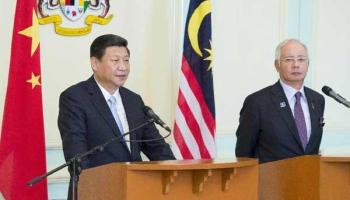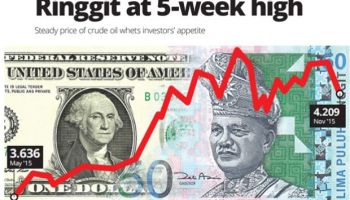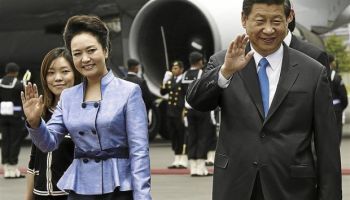I was going to write about disruptive technology but the whole week was taken up with the disruption that Donald J Trump caused in upsetting the US establishment by winning the Presidential elections.
The establishment was so confident of a Hillary win that the New York Times predicted 85 per cent chance of her winning and the Economist magazine showed a cover picture with Hillary as America and the rest of the world’s best hope.
Trump’s victory repeated the Brexit phenomenon that the elites don’t get it.
The voters are angry and even if Hillary had the support of women, African Americans and Latinos, it was not enough.
Trump basically tapped into the anger in the dominant American white voter that life has not been good in the last 30 years, attributing this to globalisation, immigration, disruptive technology and mostly, the failure of the elites to listen.
There was something quite Darwinian about the US elections.
Here was an alpha male challenging the establishment, both on the Republican and Democratic sides.
Against all odds, he defeated the Bush dynasty and the Republican party leadership to win the nomination.
Then he crushed the alpha female (Hillary), partly because somehow no one could quite trust what she really stood for.
Certainly, Wall Street would have benefited most, being her major supporter.
But no one quite trusts banksters these days.
Trump put the Clinton/Obama dynasty into its place.
We are likely to see some major changes affecting Wall Street.
Remember how in 1934, newly elected President Franklin Roosevelt sent Joseph Kennedy Senior to go after Wall Street?
How did Trump get there?
Firstly, as a businessman, he understood that the old model was broken because he read the signals right – the average American voter was angry and wanted their issues fixed.
Secondly, he knew that the mainstream establishment media was against him but they didn't get what his pollsters were reading.
The Web traffic was showing that his outrageous statements were touching raw nerves.
Politics ultimately is about the gut rather than the rational mind.
Thirdly, the pollsters were reading the old tea leaves, not appreciating how voters were refusing to show their hand till the last minute.
An American friend had this insight – most of his friends refused to tell anyone that they supported Trump.
They did not want to appear politically incorrect to support a ranting candidate that was not playing to the traditional songs.
But they wanted change – and Obama did not deliver what they wanted.
What next for Trump and for Asia?
Based upon his campaign language, Trump is likely to be quite tough on allies and competitors alike.
American military support wouldn’t come free for allies and he is also likely to be tougher on his foes.
This means essentially that everyone will have to look after their own interests.
The election also showed that what concerns the voter most is the need for good jobs.
This is where globalisation and technology disruption have upset the status quo.
Jobs either go abroad where wages are cheaper or technology is such that most manufacturing can be done onshore, but robotics are replacing grunt labour.
Hence the only Tech Age solution is proper education and training on the job.
In the tech age, governments cannot assume that the market will provide the jobs without state help.
Employers need to be aware that you can’t shed labour without investing in people.
Universities and schools have been disrupted by the Internet, because the best teaching is now accessible online and mostly free.
Massive Open Online Curriculum (MOOC) means that anyone can access the best online lecture course by some of the top lecturers at the best universities, fully up to date.
Who needs uninterested local professors who are still teaching out-dated texts they learnt thirty years ago?
Digital divide
The Digital Divide means the line between those who are digitally connected and those who are not.
Increasingly, societies are networks across which goods, services, information and value are traded, exchanged and created.
Those who have access to these networks grow wealthier, outstripping those who are not.
Hong Kong is a perfect example of how cities become successful by being a free port, where there are low transaction costs, with rule of law and access to free information.
Having superior marine port, airport and road and now rail connection to the Mainland of China made Hong Kong not just the entrepot centre for Chinese trade with the world, but also a globally connected city.
But making money through trade, finance and real estate is no longer viable when every business is disrupted by technology.
Alibaba, Amazon, Google and Facebook are just a bunch of smart people that integrate multiple markets using their digital platform.
Their cost expense ratios are a fraction of the traditional bricks and employee business of Walmart, real estate developers, banks and newspapers.
They have global reach, especially the young and mobile.
All this means that as America becomes strong under Trump (which he promised), every country or city needs to compete even more fiercely in the digital age.
Cities have better chances of getting their acts together to get the government, business and civil society to work together and achieve how they really want to compete in the digital age.
I was in Shenzhen last month looking at how they are coping with the digital age.
Shenzhen is now green and dynamic, with showcase drone technology, Huawei telecommunications and genomic technology that are at the cutting edge of innovation.
No one I talked to cared about the angst that was going on in Hong Kong, where the young and old are still squabbling over their own identities.
Shenzhen was moving to compete head-on with Silicon Valley, Bangalore, Shanghai and Hangzhou. And this is a city that thirty years ago had no university of its own and no serious manufacturing to speak of. This is an immigrant city par excellence finding its own place in global technology.
Disruption comes from sheer willpower. Either you disrupt or you become disrupted.
Trump and Shenzhen are showing the way. Everyone else please wake up.
 By Andrew Sheng, Asia News Network/The Star
By Andrew Sheng, Asia News Network/The Star
The writer, a Distinguished Fellow of Hong Kong-based think-tank Fung Global Institute, writes on global issues from an Asian perspective.

Related posts:

The establishment was so confident of a Hillary win that the New York Times predicted 85 per cent chance of her winning and the Economist magazine showed a cover picture with Hillary as America and the rest of the world’s best hope.
Trump’s victory repeated the Brexit phenomenon that the elites don’t get it.
The voters are angry and even if Hillary had the support of women, African Americans and Latinos, it was not enough.
Trump basically tapped into the anger in the dominant American white voter that life has not been good in the last 30 years, attributing this to globalisation, immigration, disruptive technology and mostly, the failure of the elites to listen.
There was something quite Darwinian about the US elections.
Here was an alpha male challenging the establishment, both on the Republican and Democratic sides.
Against all odds, he defeated the Bush dynasty and the Republican party leadership to win the nomination.
Then he crushed the alpha female (Hillary), partly because somehow no one could quite trust what she really stood for.
Certainly, Wall Street would have benefited most, being her major supporter.
But no one quite trusts banksters these days.
Trump put the Clinton/Obama dynasty into its place.
We are likely to see some major changes affecting Wall Street.
Remember how in 1934, newly elected President Franklin Roosevelt sent Joseph Kennedy Senior to go after Wall Street?
How did Trump get there?
Firstly, as a businessman, he understood that the old model was broken because he read the signals right – the average American voter was angry and wanted their issues fixed.
Secondly, he knew that the mainstream establishment media was against him but they didn't get what his pollsters were reading.
The Web traffic was showing that his outrageous statements were touching raw nerves.
Politics ultimately is about the gut rather than the rational mind.
Thirdly, the pollsters were reading the old tea leaves, not appreciating how voters were refusing to show their hand till the last minute.
An American friend had this insight – most of his friends refused to tell anyone that they supported Trump.
They did not want to appear politically incorrect to support a ranting candidate that was not playing to the traditional songs.
But they wanted change – and Obama did not deliver what they wanted.
What next for Trump and for Asia?
Based upon his campaign language, Trump is likely to be quite tough on allies and competitors alike.
American military support wouldn’t come free for allies and he is also likely to be tougher on his foes.
This means essentially that everyone will have to look after their own interests.
The election also showed that what concerns the voter most is the need for good jobs.
This is where globalisation and technology disruption have upset the status quo.
Jobs either go abroad where wages are cheaper or technology is such that most manufacturing can be done onshore, but robotics are replacing grunt labour.
Hence the only Tech Age solution is proper education and training on the job.
In the tech age, governments cannot assume that the market will provide the jobs without state help.
Employers need to be aware that you can’t shed labour without investing in people.
Universities and schools have been disrupted by the Internet, because the best teaching is now accessible online and mostly free.
Massive Open Online Curriculum (MOOC) means that anyone can access the best online lecture course by some of the top lecturers at the best universities, fully up to date.
Who needs uninterested local professors who are still teaching out-dated texts they learnt thirty years ago?
Digital divide
The Digital Divide means the line between those who are digitally connected and those who are not.
Increasingly, societies are networks across which goods, services, information and value are traded, exchanged and created.
Those who have access to these networks grow wealthier, outstripping those who are not.
Hong Kong is a perfect example of how cities become successful by being a free port, where there are low transaction costs, with rule of law and access to free information.
Having superior marine port, airport and road and now rail connection to the Mainland of China made Hong Kong not just the entrepot centre for Chinese trade with the world, but also a globally connected city.
But making money through trade, finance and real estate is no longer viable when every business is disrupted by technology.
Alibaba, Amazon, Google and Facebook are just a bunch of smart people that integrate multiple markets using their digital platform.
Their cost expense ratios are a fraction of the traditional bricks and employee business of Walmart, real estate developers, banks and newspapers.
They have global reach, especially the young and mobile.
All this means that as America becomes strong under Trump (which he promised), every country or city needs to compete even more fiercely in the digital age.
Cities have better chances of getting their acts together to get the government, business and civil society to work together and achieve how they really want to compete in the digital age.
I was in Shenzhen last month looking at how they are coping with the digital age.
Shenzhen is now green and dynamic, with showcase drone technology, Huawei telecommunications and genomic technology that are at the cutting edge of innovation.
No one I talked to cared about the angst that was going on in Hong Kong, where the young and old are still squabbling over their own identities.
Shenzhen was moving to compete head-on with Silicon Valley, Bangalore, Shanghai and Hangzhou. And this is a city that thirty years ago had no university of its own and no serious manufacturing to speak of. This is an immigrant city par excellence finding its own place in global technology.
Disruption comes from sheer willpower. Either you disrupt or you become disrupted.
Trump and Shenzhen are showing the way. Everyone else please wake up.
 By Andrew Sheng, Asia News Network/The Star
By Andrew Sheng, Asia News Network/The Star The writer, a Distinguished Fellow of Hong Kong-based think-tank Fung Global Institute, writes on global issues from an Asian perspective.
Trump policies
DONALD
Trump’s shock upset in last week’s US presidential elections have
triggered a massive move in the global currency markets over the past
few days.
The alternative view - By M. Shanmugam
REGIONAL currencies coming under pressure after the US presidential election were something that was expected given that the Federal Reserve was looking at raising interest rates before the year ends.
REGIONAL currencies coming under pressure after the US presidential election were something that was expected given that the Federal Reserve was looking at raising interest rates before the year ends.
SINGAPORE/KUALA
LUMPUR: Malaysia's ringgit plunged to its weakest in more than 12 years
in offshore markets on Friday as investors dumped government bonds,
forcing the central bank to use its persuasive powers to keep the spot
rate steady by deterring sellers onshore.
Related posts:
https://youtu.be/YKIOAMcTuWI NEW YORK, Nov. 9 -- Republican candidate Donald Trump was projected by U.S. media to have won the 270 ...


 US president-elect Donald Trump gives a speech during election night at the New York Hilton Midtown in New York on Nov 8, 2016. PHOTO: AFP
US president-elect Donald Trump gives a speech during election night at the New York Hilton Midtown in New York on Nov 8, 2016. PHOTO: AFP



















